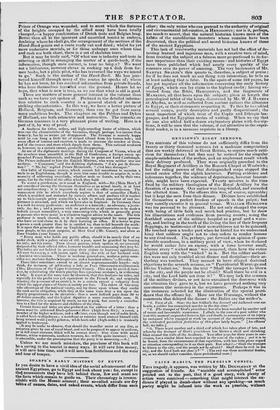SHARPE'S EARLY HISTORY OF EGYPT.
IF you desire to have a vivid idea of the social advancement of the ancient Egyptians, go to Egypt and look about you : for, except in the monuments they have left behind them, few and scant are the facts which remain to guide us. Their chronology is irrecon- cilable with the Mosaic account; their so-called annals are dry tables of names, dates, and naked events, which differ from each other; the only writer who can pretend to the authority of original and circumstantial information, is HERODOTUS; nor is it, perhaps, too much to assert, that the natural historian knows more of the habits of the antediluvian monsters whose remains have been discovered, than the political and moral historian knows of those of the ancient Egyptians. This lack of trustworthy materials has not had the effect of de- terring learned and ingenious men, with a creative turn of mind, from treating the subject at a fulness more proportioned to its for- mer importance than their existing means : and histories of Egypt have been published which had nearly every quality of the romance save its power of amusing. The very barrenness of Mr. SAMUEL SHARPE'S thin quarto is, therefore, a subject of praise ; for if he does not teach us any thing very interesting, he tells us at least nothing that is false. En the space of some 160 pages, he has got together all the information concerning the early history of Egypt, which can lay claim to the highest credit; having ex- tracted from the Bible, HERODOTUS, and the fragments of MANETHO, all that bears upon the subject; given at length the genealogical tablet of the kings, discovered by Mr. W. J. BArvitus at Abydus, as well as collected from ancient authors the allusions to Egypt, or their statements respecting it. To this he has added several essays, partly descriptive and partly disquisitional ; the most important of which treat of the Coptic and Ethiopic lan- guages, and the Egyptian modes of writing. When we say that he has also added half-a-dozen explanatory plates with descrip- tions, it will be seen that the volume, if not attractive to the super. tidal reader, is in a measure requisite in a library.


























 Previous page
Previous page